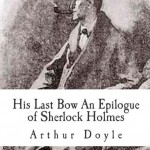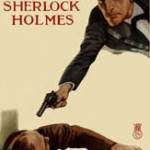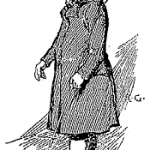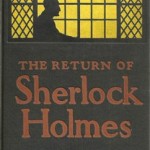“He gave an exclamation; that was all. I waited but he never returned. Then I walked home. Next morning, after the office opened, they came to inquire. About twelve o’clock we heard the terrible news. Oh, Mr. Holmes, if you could only, only save his honour! It was so much to him.”
Holmes shook his head sadly.
“Come, Watson,” said he, “our ways lie elsewhere. Our next station must be the office from which the papers were taken.
“It was black enough before against this young man, but our inquiries make it blacker,” he remarked as the cab lumbered off. “His coming marriage gives a motive for the crime. He naturally wanted money. The idea was in his head, since he spoke about it. He nearly made the girl an accomplice in the treason by telling her his plans. It is all very bad.”
“But surely, Holmes, character goes for something? Then, again, why should he leave the girl in the street and dart away to commit a felony?”
“Exactly! There are certainly objections. But it is a formidable case which they have to meet.”
Mr. Sidney Johnson, the senior clerk, met us at the office and received us with that respect which my companion’s card always commanded. He was a thin, gruff, bespectacled man of middle age, his cheeks haggard, and his hands twitching from the nervous strain to which he had been subjected.
“It is bad, Mr. Holmes, very bad! Have you heard of the death of the chief?”
“We have just come from his house.”
“The place is disorganized. The chief dead, Cadogan West dead, our papers stolen. And yet, when we closed our door on Monday evening, we were as efficient an office as any in the government service. Good God, it’s dreadful to think of! That West, of all men, should have done such a thing!”
“You are sure of his guilt, then?”
“I can see no other way out of it. And yet I would have trusted him as I trust myself.”
“At what hour was the office closed on Monday?”
“At five.”
“Did you close it?”
“I am always the last man out.”
“Where were the plans?”
“In that safe. I put them there myself.”
“Is there no watchman to the building?”
“There is, but he has other departments to look after as well. He is an old soldier and a most trustworthy man. He saw nothing that evening. Of course the fog was very thick.”
“Suppose that Cadogan West wished to make his way into the building after hours; he would need three keys, would he not, before he could reach the papers?”
“Yes, he would. The key of the outer door, the key of the office, and the key of the safe.”
“Only Sir James Walter and you had those keys?”
“I had no keys of the doors–only of the safe.”
“Was Sir James a man who was orderly in his habits?”
“Yes, I think he was. I know that so far as those three keys are concerned he kept them on the same ring. I have often seen them there.”
“And that ring went with him to London?”
“He said so.”
“And your key never left your possession?”
“Never.”
“Then West, if he is the culprit, must have had a duplicate. And yet none was found upon his body. One other point: if a clerk in this office desired to sell the plans, would it not be simpler to copy the plans for himself than to take the originals, as was actually done?”
“It would take considerable technical knowledge to copy the plans in an effective way.”
“But I suppose either Sir James, or you, or West has that technical knowledge?”
“No doubt we had, but I beg you won’t try to drag me into the matter, Mr. Holmes. What is the use of our speculating in this way when the original plans were actually found on West?”
“Well, it is certainly singular that he should run the risk of taking originals if he could safely have taken copies, which would have equally served his turn.”






